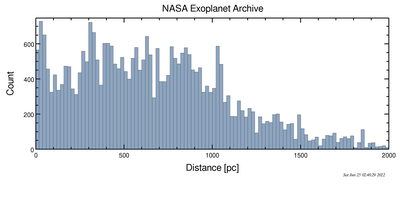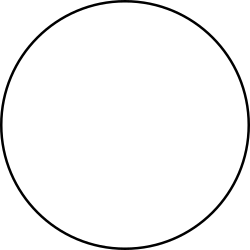Lists of planets
These are lists of planets. A planet is a large, rounded astronomical body that is neither a star nor its remnant. The best available theory of planet formation is the nebular hypothesis, which posits that an interstellar cloud collapses out of a nebula to create a young protostar orbited by a protoplanetary disk. There are eight planets within the Solar System; planets outside of the solar system are also known as exoplanets.

As of 15 July 2024, there are 5,690 confirmed exoplanets in 4,238 planetary systems, with 956 systems having more than one planet.[1] Most of these were discovered by the Kepler space telescope. There are an additional 1,982 potential exoplanets from Kepler's first mission yet to be confirmed, as well as 976 from its "Second Light" mission and 4,648 from the Transiting Exoplanet Survey Satellite (TESS) mission.[2]
- Transit: 4,224 (74.2%)
- Radial velocity: 1,092 (19.2%)
- Microlensing: 223 (3.9%)
- Direct imaging: 82 (1.4%)
- Transit-timing variation: 29 (0.5%)
- Eclipse timing variation: 17 (0.3%)
- Orbital brightness modulation: 9 (0.2%)
- Pulsar timing variation: 8 (0.1%)
- Astrometry: 3 (0.1%)
- Pulsation timing variation: 2 (0.0%)
- Disk kinematics: 1 (0.0%)
In the Solar System
[edit]- For a list of geophysical planets in the Solar System, see: List of gravitationally rounded objects of the Solar System This also includes a list of the eight planets according to the IAU definition.
- For a list of objects in the Solar System once but no longer generally considered planets, see: List of former planets
- For a list of objects in the Solar System, including planets, that have been or are believed to exist, but either have not been proven or have been disproven, see: List of hypothetical Solar System objects
Outside the Solar System
[edit]
- List of directly imaged exoplanets
- List of exoplanet extremes
- List of exoplanet firsts
- List of exoplanets discovered by the Kepler space telescope
- List of exoplanets observed during Kepler's K2 mission
- List of extrasolar candidates for liquid water
- List of hottest exoplanets
- List of coolest exoplanets
- List of multiplanetary systems
- List of nearest exoplanets
- List of nearest terrestrial exoplanet candidates
- List of potentially habitable exoplanets
- List of proper names of exoplanets
- List of largest exoplanets
- List of smallest exoplanets
- List of transiting exoplanets
Lists of exoplanets by year of discovery
[edit]- List of exoplanets discovered before 2000 (31)
- List of exoplanets discovered between 2000–2009 (377)
- List of exoplanets discovered in 2010 (109)
- List of exoplanets discovered in 2011 (178)
- List of exoplanets discovered in 2012 (149)
- List of exoplanets discovered in 2013 (151)
- List of exoplanets discovered in 2014 (870)
- List of exoplanets discovered in 2015 (150)
- List of exoplanets discovered in 2016 (1497)
- List of exoplanets discovered in 2017 (158)
- List of exoplanets discovered in 2018 (305)
- List of exoplanets discovered in 2019 (172)
- List of exoplanets discovered in 2020 (253)
- List of exoplanets discovered in 2021 (257)
- List of exoplanets discovered in 2022 (313)
- List of exoplanets discovered in 2023 (299)
- List of exoplanets discovered in 2024 (142)
- Extrasolar systems
- List of multiplanetary systems
- List of exoplanets discovered using the Kepler space telescope
- List of stars with proplyds
- List of rogue planets
- Exoplanets by method of detection
- List of exoplanets detected by radial velocity
- List of transiting exoplanets
- List of exoplanets detected by microlensing
- List of directly imaged exoplanets
- List of exoplanets detected by timing
- Records in exoplanet detection
- Potential terrestrial exoplanets
Fictional or non-scientific planets
[edit]- For a list of planets as used in astrology, see: Planets in astrology
- For a list of supposed planets not based on scientific evidence, see: Planetary objects proposed in religion, astrology, ufology and pseudoscience
- For lists of planets in fiction, see: Fictional planets of the Solar System, Extrasolar planets in fiction § List, and List of Star Wars planets and moons
Mixed
[edit]- List of planet types (etymologically accepting of multiple categories)
See also
[edit]- Lists of astronomical objects
- Classical planet
- Definition of planet
- List of exoplanet search projects
References
[edit]- ^ "Exoplanet and Candidate Statistics". NASA Exoplanet Archive. Retrieved 15 July 2024.
- ^ a b "Exoplanet and Candidate Statistics". NASA Exoplanet Archive. NASA Exoplanet Science Institute. Retrieved 14 March 2024.
External links
[edit]- The NASA Exoplanet Archive
- The Extrasolar Planet Encyclopaedia — Catalog Listing accessed in 2015-09-28
- Exoplanet Data Explorer accessed in 2015-09-28
- "Open Exoplanets Catalogue". Retrieved 2017-02-27.
- Wright, J. T.; Fakhouri, O.; Marcy, G. W.; Han, E.; Feng, Y.; Johnson, John Asher; Howard, A. W.; Fischer, D. A.; Valenti, J. A. (2011-04-01). "The Exoplanet Orbit Database". Publications of the Astronomical Society of the Pacific. 123 (902): 412–422. arXiv:1012.5676. Bibcode:2011PASP..123..412W. doi:10.1086/659427. ISSN 0004-6280. S2CID 51769219.
| Ground-based |
| ||||||||||
|---|---|---|---|---|---|---|---|---|---|---|---|
| Space missions |
| ||||||||||
| Related | |||||||||||
| |||||||||||||||||||||||||
| Lists | |||||||||||||||||||||||||
| Hypothetical | |||||||||||||||||||||||||
See also: Formation and evolution of the Solar System, list of the Solar System's objects by discovery date, by orbit, and by radius or mass, and the Solar System Portal | |||||||||||||||||||||||||
Text is available under the CC BY-SA 4.0 license; additional terms may apply.
Images, videos and audio are available under their respective licenses.





